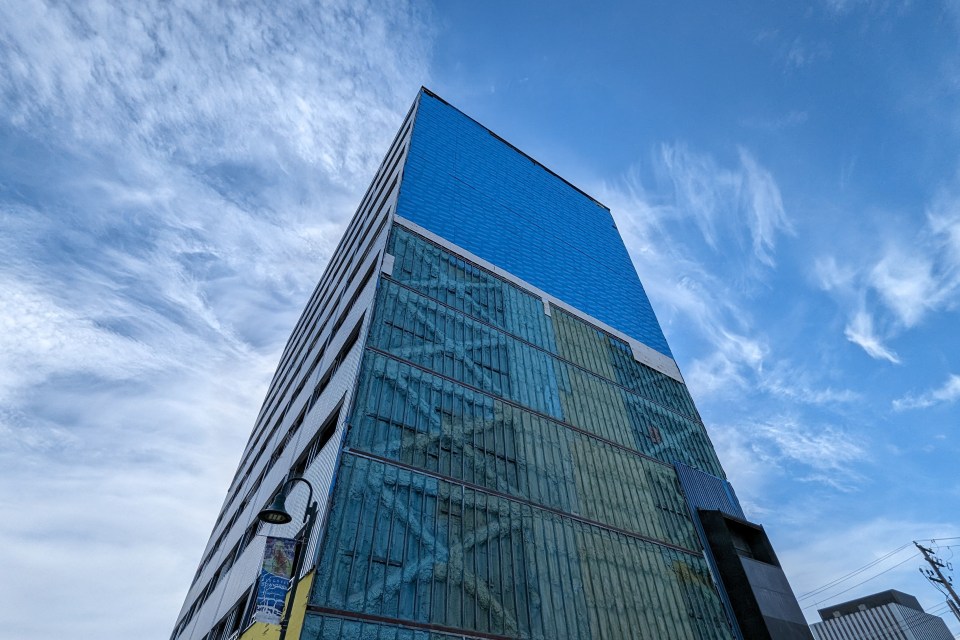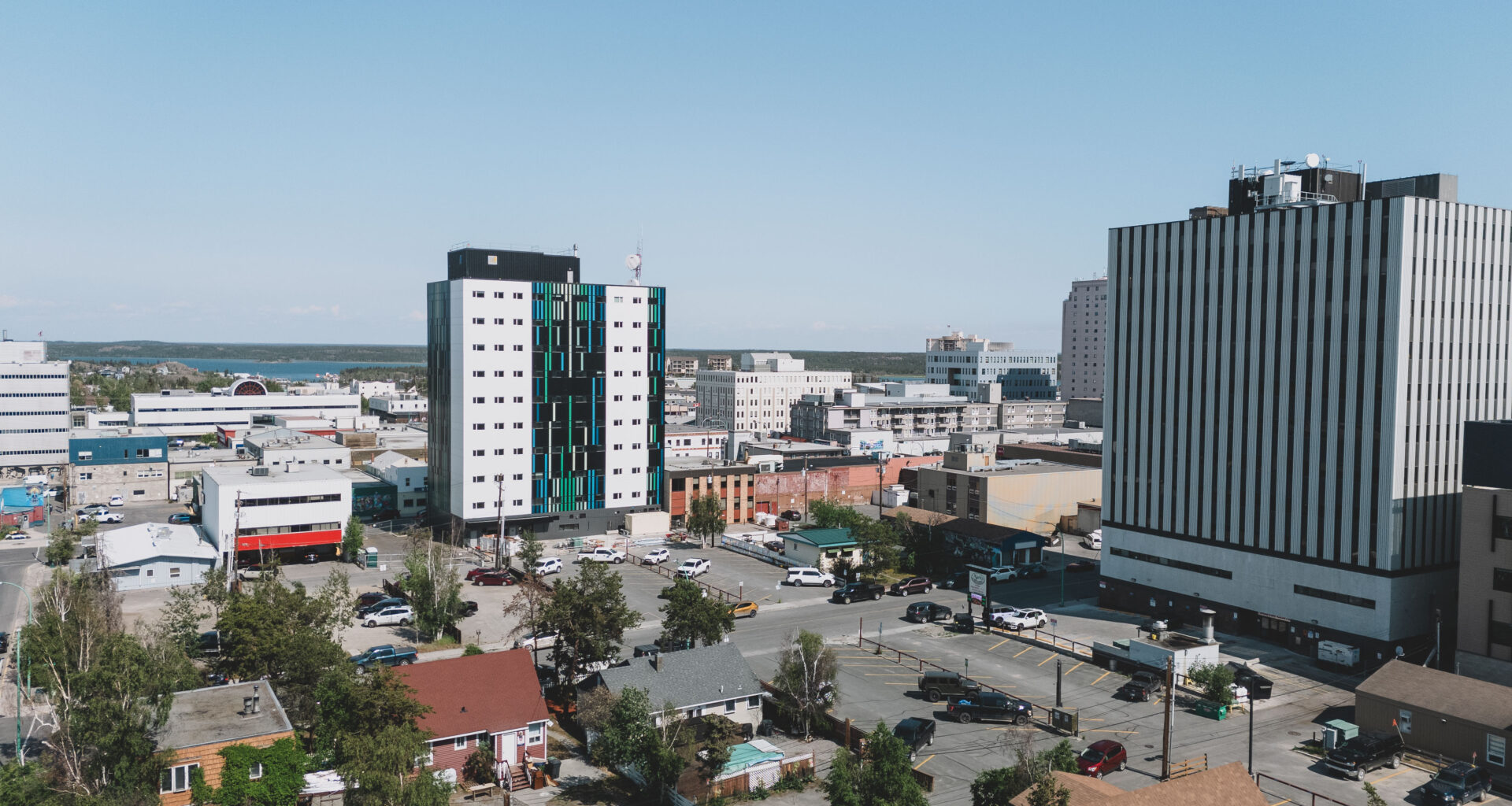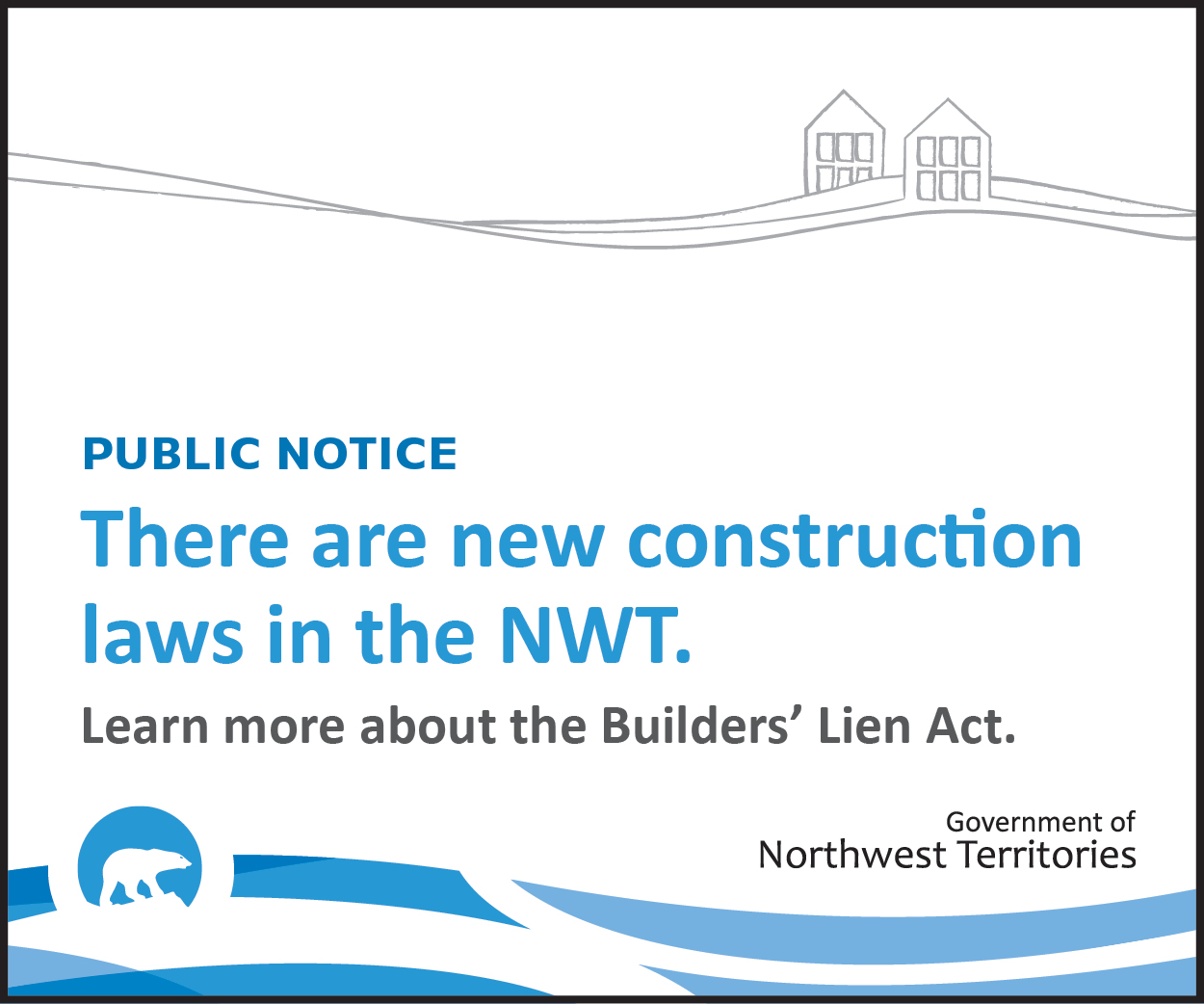A downtown Yellowknife housing development appears incapable of opening because the owners can’t afford a required fire hydrant vault.
Borealis Development, which transformed the vacant Bellanca office building into 72 housing units known as The Nest, carried out that refit without realizing a hydrant vault was needed.
A vault is a mostly buried, separate structure that accommodates quick access to a water main. It’s considered one of the most reliable ways to deliver a constant supply of water to city firefighters in an emergency.
 Work in progress to transform the Bellanca building into The Nest in April 2024. Sarah Pruys/Cabin Radio
Work in progress to transform the Bellanca building into The Nest in April 2024. Sarah Pruys/Cabin Radio
Borealis has been told installing a vault will cost $750,000 but says it has no money left and can’t find anyone else prepared to invest that sum.
Since July, the company has been asking the City of Yellowknife to pay for most of the costs instead.
A vault could cost much less than $750,000 – estimates drop as low as $300,000 according to documents associated with council discussions – but city councillors appear unwilling to hand over that much taxpayer money.
Multiple councillors say other developers, who understood the rules, paid for hydrant vaults themselves, and treating Borealis differently would set an unwanted precedent.
Council has yet to formally vote on giving Borealis any cash. If the vote is a no, which appears likely, it’s unclear how the building’s 72 units will ever open. Officials can’t allow occupancy to go ahead if The Nest doesn’t meet requirements.
Meanwhile, lawyer Scott Parker – representing Borealis – told council on Monday that the vacant building is costing Borealis “over $150,000 a month in taxes, utilities and interest, and those bills are piling up.”
“This is urgent. Borealis can’t keep going much longer without getting the building occupied,” Parker said.
But Steve Payne summed up the mood of councillors present when he said: “I don’t think it’s on city staff to, for lack of a better term, hold the hand of a developer.”
‘Excruciating archaeological dig’
The road to this point was complicated.
Turning the vacant Bellanca office block into an apartment building has taken Borealis years and a lot of money, which itself took a long time to find through financing.
Borealis maintains that when it drew up its plans for the refit that turned the building into The Nest, the requirement for a hydrant vault didn’t exist. That was added in a city bylaw that came into effect in 2022.
However, financing for the work didn’t come through until 2023 and stamped drawings weren’t submitted to the city until December that year – by which point the requirement for a hydrant vault had been on the city’s books for months.
Borealis says its experts had multiple conversations with city staff, like planners and fire hall representatives, but still weren’t aware of the requirement. City staff have suggested that developers have an obligation to, in city manager Stephen Van Dine’s words, carry out their own technical work “adequately and competently.”
That has left council carrying out what Mayor Ben Hendriksen termed an “excruciating archaeological dig” to determine who knew what and when, in an attempt to establish which party dropped the ball.
Parker, who said his client Borealis didn’t fully comprehend the hydrant vault requirement until February 2024, said City Hall covering 75 percent of the vault’s cost “would be a real win for opening The Nest” and would get critical new housing on the market in the quickest possible time.
“If we can’t figure out some kind of a solution, then The Nest is going to sit there and it’s going to be empty and unused,” he said.
The building does have a wall hydrant, a different type of installation that’s housed within the structure. The city doesn’t like them.
“What we’ve experienced in the city over the past couple of decades is facilities that have had wall hydrants installed are also the buildings that are on fire,” public safety director Craig MacLean bluntly told councillors.
Borealis appears to have installed a wall hydrant even though it knew the city didn’t think that was adequate. Parker said that was a recent “extra effort to be in compliance” and Borealis themselves called it a “secondary measure.”
How councillors felt
Van Dine asked council to focus on the narrow question of whether or not to help pay for the hydrant vault. Councillors, though, spent more than an hour trying to establish how much due diligence Borealis had done and what kind of precedent might be set.
Van Dine noted multiple downtown developments had gone ahead in the past few years with developers shouldering the cost of hydrant vaults.
Councillor Tom McLennan floated a form of deal whereby Borealis would increase the number of units considered “affordable” under federal guidelines – currently eight of the 72 – in return for taxpayer assistance, but was told that wasn’t a formal deal the city could strike. (Borealis said it could “definitely look at” increasing the share of affordable units.)
“I think in the end,” McLennan said, “it’s on the developer to ensure that they’re covering all their bases.”
At a meeting where multiple councillors were absent, Cat McGurk agreed with McLennan. “I think it’s very hard for me to support this and set the precedent,” she said.
“I can’t, in good conscience, put Yellowknife taxpayer money toward this development at this time, when we look at what other developers have to do in order to bring projects forward,” Mayor Hendriksen concluded.
“There’s just too many unclosed loops around decisions, advice, timelines.”
A formal vote will occur at a future council meeting.
“I can’t tell you what will happen to The Nest if the city says no to this cost-sharing,” Parker told council, trying to change some minds.
“But I can tell you what will happen if the city says yes: we’re well on our way to achieving a more vibrant and livable downtown, bringing more units into the Yellowknife rental market, and doing so safely.”
Related Articles









